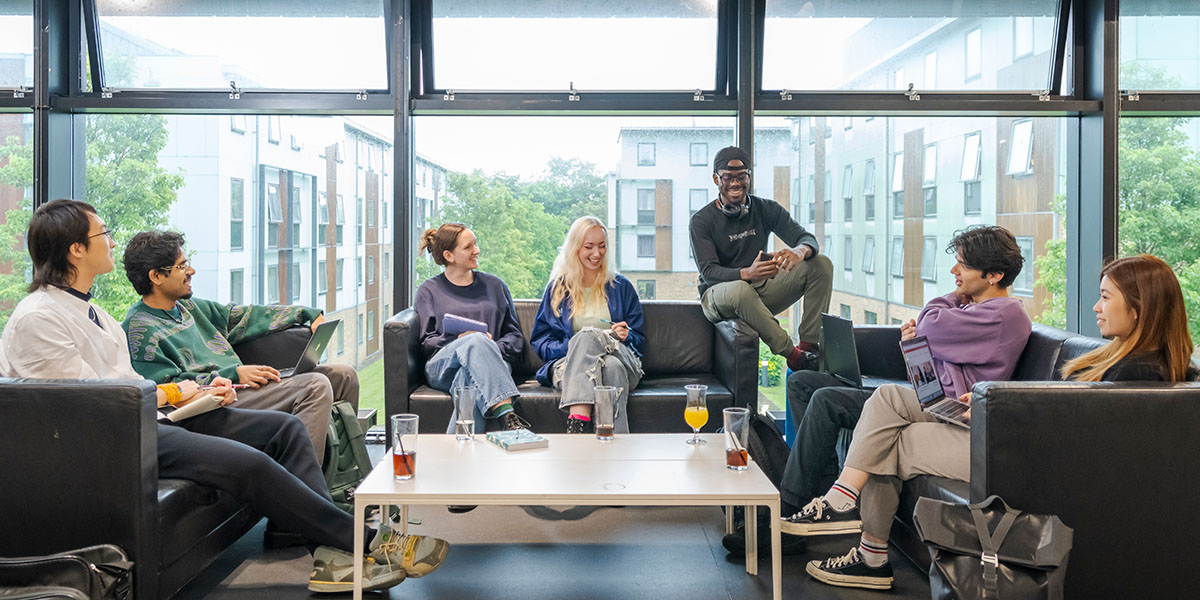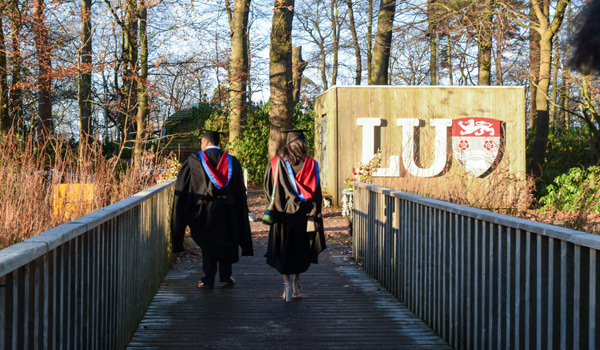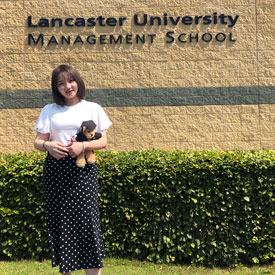Lancaster University Economics Society is a student-led organisation open to students from all degree backgrounds who are eager to explore the dynamic field of economics. The group connects members with current and exciting research while fostering a supportive and social environment. You can join society events, socials, and sports teams, form friendships, and enhance your learning experience, making studying economics more productive and enjoyable.
We welcome applications from the United States of America
We've put together information and resources to guide your application journey as a student from the United States of America.
Overview
Top reasons to study with us
-
9
9th for graduate prospects: Economics
The Guardian University Guide (2025)
-
10
10th for Economics
The Times and Sunday Times Good University Guide (2025)
-
12
12th for Economics
The Guardian University Guide (2025)
Introduction
What makes some countries richer than others? How should society fund social care? Why are footballers paid so much? As a BA Economics (Industry) graduate, you will have the analytic skills and intellectual toolbox to help answer these questions and many more. You will learn how to interpret data, understand (and quantify) the decisions made by individuals, organisations, and governments, and evaluate economic policies.
Why Lancaster?
BA Economics begins by introducing the foundational principles of economic theory. The analytical skills you gain will then be connected with insights from other social sciences, such as politics, international relations, sociology and history. This flexible degree is designed to allow you to take the skills you will learn and apply them to multiple careers.
You will cover the fundamentals of economic theory and practice, and as your degree progresses and you discover more about both the subject and yourself, you can flex this course in ways that speak to your changing interests and strengths. This flexibility means you play a major part in building the degree you want and might lead you to study themes such as:
- Development economics
- Economic inequality
- Monetary economics
- Labour economics
This course weaves theory and evidence into policy analysis. This allows you to understand fundamental issues and topical concerns. In the BA in Economics, we give students a broader appreciation of key issues in society by combining economic analysis with insights from the other social sciences. Therefore, in your first year, you will also choose one subject from the social sciences.
In the second year, you will progress to topics such as micro and macroeconomics and quantitative methods, which provide many of the analytical tools used in economics, along with some economics options and a further module from the social sciences.
Your third year is spent in industry. You’ll be supported in securing a placement, with past students joining companies such as IBM, Lloyds Bank, Microsoft, PwC and the Bank of England. Roles on offer range from project management and logistics to investment, business development and risk. Most placements are in the UK, but there are some options available overseas.
Your final year involves choosing economics modules and some additional options from the social sciences. Topics you might study include public policy, international trade, and monetary economics, so you can tailor your studies to suit your aspirations.
Careers
A Bachelor of Arts (BA) in Economics provides graduates with a solid foundation in economic theory, data analysis, and critical thinking. This versatile degree enables them to pursue careers across various fields. The sectors our BA Economics graduates typically enter include finance and banking, business and management, consulting and government. Recent graduates have joined organisations including:
- Schroders
- Mercer
- Allianz Commercial
- Bank of Ireland
- EY
Many of our graduates have secured places on postgraduate courses at top institutions and subsequently pursued specialised careers as economists, including roles at the Bank of Ireland, the Government Economics Service, and within academia.
Our award-winning careers team provides dedicated careers and placement services. We offer a range of innovative services for Management School students including:
- Embedded careers education throughout the degree
- Careers information, advice and guidance appointments with specialist careers coaches
- Weekly workshops on key employability skills
- Exposure to international career options and networks
- Connections to strong networks of employers and alumni
- Support in finding and acquiring work experience opportunities, including placements and internships
- Lifelong access to all LUMS Careers services
Lancaster University is dedicated to helping you earn a highly respected degree while equipping you with essential life and professional skills. We are proud to offer every student the opportunity to participate in The Lancaster Award. This programme allows you to engage in valuable activities such as work experience, volunteering, company projects, student societies, and sports clubs. Visit our careers section for more details.
Entry requirements
These are the typical grades that you will need to study this course. You may need to have qualifications in relevant subjects. In some cases we may also ask you to attend an interview or submit a portfolio. You must also meet our English language requirements.
Find more about these qualifications and others not shown here
Qualifications and typical requirements accordion
AAB
36 Level 3 credits at Distinction plus 9 Level 3 credits at Merit
We accept the Advanced Skills Baccalaureate Wales in place of one A level, or equivalent qualification, as long as any subject requirements are met.
DDD
A level at grade B plus BTEC(s) at DD, or A levels at grade AB plus BTEC at D
35 points overall with 16 points from the best 3 HL subjects
We are happy to admit applicants on the basis of five Highers, but where we require a specific subject at A level, we will typically require an Advanced Higher in that subject. If you do not meet the grade requirement through Highers alone, we will consider a combination of Highers and Advanced Highers in separate subjects. Please contact the Admissions team for more information.
Distinction overall
Contact Admissions
If you are thinking of applying to Lancaster and you would like to ask us a question, please complete our enquiry form and one of our team will get back to you.
International foundation programmes
Delivered in partnership with INTO Lancaster University, our one-year tailored foundation pathways are designed to improve your subject knowledge and English language skills to the level required by a range of Lancaster University degrees. Visit the INTO Lancaster University website for more details and a list of eligible degrees you can progress onto.
Contextual admissions
Contextual admissions could help you gain a place at university if you have faced additional challenges during your education which might have impacted your results. Visit our contextual admissions page to find out about how this works and whether you could be eligible.
Course structure
Enhancing our curriculum
We continually review and enhance our curriculum to ensure we are delivering the best possible learning experience, and to make sure that the subject knowledge and transferable skills you develop will prepare you for your future.
We will publish more detailed information about the structure of this degree course for 2026-entry in June 2025, ahead of our summer undergraduate open days. This will include overviews of the core modules you will take and examples of optional modules which may be available to you.
Fees and funding
We set our fees on an annual basis and the 2026/27 entry fees have not yet been set.
As a guide, our fees in 2025/26 were:
| Home | International |
|---|---|
| £9,535 | £25,450 |
Additional fees and funding information accordion
There may be extra costs related to your course for items such as books, stationery, printing, photocopying, binding and general subsistence on trips and visits. Following graduation, you may need to pay a subscription to a professional body for some chosen careers.
Specific additional costs for studying at Lancaster are listed below.
College fees
Lancaster is proud to be one of only a handful of UK universities to have a collegiate system. Every student belongs to a college, and all students pay a small college membership fee which supports the running of college events and activities. Students on some distance-learning courses are not liable to pay a college fee.
For students starting in 2025, the fee is £40 for undergraduates and research students and £15 for students on one-year courses.
Computer equipment and internet access
To support your studies, you will also require access to a computer, along with reliable internet access. You will be able to access a range of software and services from a Windows, Mac, Chromebook or Linux device. For certain degree programmes, you may need a specific device, or we may provide you with a laptop and appropriate software - details of which will be available on relevant programme pages. A dedicated IT support helpdesk is available in the event of any problems.
The University provides limited financial support to assist students who do not have the required IT equipment or broadband support in place.
Study abroad courses
In addition to travel and accommodation costs, while you are studying abroad, you will need to have a passport and, depending on the country, there may be other costs such as travel documents (e.g. VISA or work permit) and any tests and vaccines that are required at the time of travel. Some countries may require proof of funds.
Placement and industry year courses
In addition to possible commuting costs during your placement, you may need to buy clothing that is suitable for your workplace and you may have accommodation costs. Depending on the employer and your job, you may have other costs such as copies of personal documents required by your employer for example.
The fee that you pay will depend on whether you are considered to be a home or international student. Read more about how we assign your fee status.
Home fees are subject to annual review, and may be liable to rise each year in line with UK government policy. International fees (including EU) are reviewed annually and are not fixed for the duration of your studies. Read more about fees in subsequent years.
We will charge tuition fees to Home undergraduate students on full-year study abroad/work placements in line with the maximum amounts permitted by the Department for Education. The current maximum levels are:
- Students studying abroad for a year: 15% of the standard tuition fee
- Students taking a work placement for a year: 20% of the standard tuition fee
International students on full-year study abroad/work placements will be charged the same percentages as the standard International fee.
Please note that the maximum levels chargeable in future years may be subject to changes in Government policy.
Scholarships and bursaries
Details of our scholarships and bursaries for students starting in 2026 are not yet available.
You can use our scholarships for 2025-entry applicants as guidance.
Similar courses
-
Economics
- Business Economics BSc Hons : 4V13
- Business Economics (Industry) BSc Hons : 4V11
- Business Economics (Study Abroad) BSc Hons : 4V14
- Economics BA Hons : L110
- Economics BSc Hons : L100
- Economics (Industry) BSc Hons : L105
- Economics (Study Abroad) BA Hons : L113
- Economics (Study Abroad) BSc Hons : L101
- Economics and Finance BSc Hons : NL31
- Economics and Finance (Industry) BSc Hons : NL32
- Economics and Finance (Study Abroad) BSc Hons : NL33
- Economics, Politics and International Relations BA Hons : LL22
- Economics, Politics and International Relations (Industry) BA Hons : LL20
- Economics, Politics and International Relations (Study Abroad) BA Hons : LL19
- Geography and Economics BA Hons : LL71
- Geography and Economics (Placement Year) BA Hons : LL72
- Mathematics with Economics BSc Hons : G1L1
- Mathematics with Economics (Placement Year) BSc Hons : G1L2
- Mathematics with Economics (Study Abroad) BSc Hons : G1L3
- Mathematics, Operational Research, Statistics and Economics (MORSE) BSc Hons : GLN0
- Mathematics, Operational Research, Statistics and Economics (MORSE) (Industry) BSc Hons : GLN1
- Mathematics, Operational Research, Statistics and Economics (MORSE) (Study Abroad) BSc Hons : GLN2
- Philosophy, Politics and Economics BA Hons : L0V0
- Philosophy, Politics and Economics (Placement Year) BA Hons : L0V1
- Philosophy, Politics and Economics (Study Abroad) BA Hons : L0V2
Important information
The information on this site relates primarily to 2026/2027 entry to the University and every effort has been taken to ensure the information is correct at the time of publication.
The University will use all reasonable effort to deliver the courses as described, but the University reserves the right to make changes to advertised courses. In exceptional circumstances that are beyond the University’s reasonable control (Force Majeure Events), we may need to amend the programmes and provision advertised. In this event, the University will take reasonable steps to minimise the disruption to your studies. If a course is withdrawn or if there are any fundamental changes to your course, we will give you reasonable notice and you will be entitled to request that you are considered for an alternative course or withdraw your application. You are advised to revisit our website for up-to-date course information before you submit your application.
More information on limits to the University’s liability can be found in our legal information.
Our Students’ Charter
We believe in the importance of a strong and productive partnership between our students and staff. In order to ensure your time at Lancaster is a positive experience we have worked with the Students’ Union to articulate this relationship and the standards to which the University and its students aspire. View our Charter and other policies.
Undergraduate open days 2025
Our summer and autumn open days will give you Lancaster University in a day. Visit campus and put yourself in the picture.
Undergraduate Open Days
-
Virtual tour
Take five minutes and let us show you what Lancaster has to offer, from our beautiful green campus to our colleges, teaching and sports facilities.

-
Accommodation guide
Most first-year undergraduate students choose to live on campus, where you’ll find accommodation to suit different preferences and budgets.

-
The city and beyond
Our historic city is student-friendly and home to a diverse and welcoming community. Beyond the city you'll find a stunning coastline and the picturesque Lake District.




.png)













